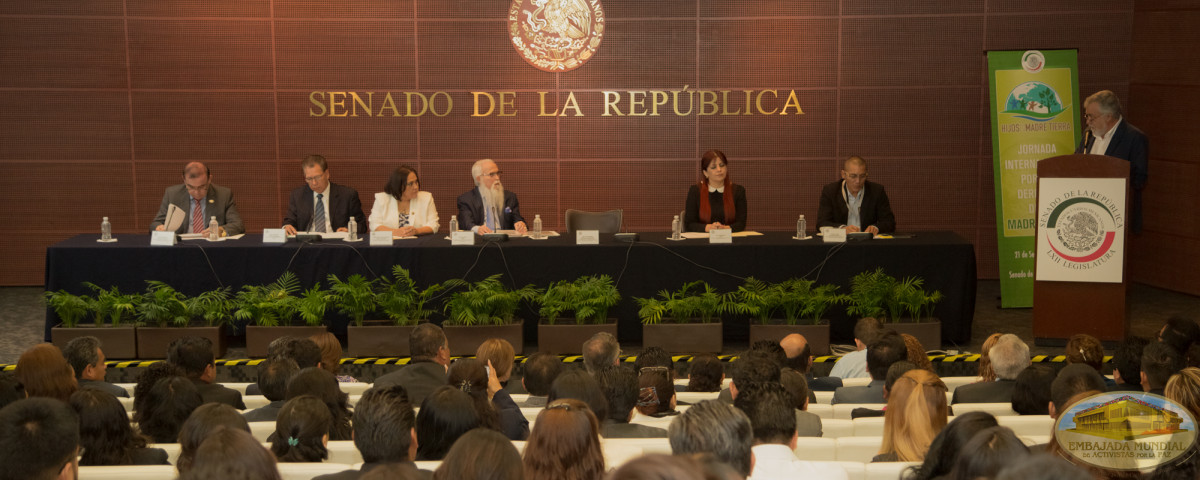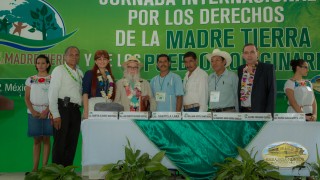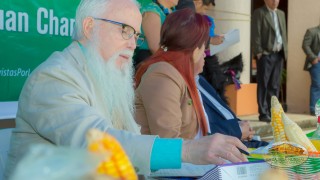The Senate of the Mexican Republic receives proposals of the GEAP in matters of environmental legislation
Legislators converge on the need to save Mother Earth
Senators and parliamentarians committed to the preservation of Mother Earth and the peace of the human family gathered in the Senate of the Mexican Republic to participate in an International Day for the Rights of Mother Earth convened by the Global Embassy of Activists for Peace (GEAP) for the submission of a proposal on environmental legislation.
On Monday, September 21st, as part of the International Day of Peace, the GEAP presented its "Children of Mother Earth" Project, an initiative of Dr. William Soto Santiago, Global Ambassador and Executive President of the institution, who has been working for years for the peace of the integral human being and of Mother Earth as a living being.
The project aims to provide legal, educational and environmental governance solutions to promote actions for a sustainable development and future that guarantees the continuity of human beings in harmony with Mother Earth.
At this meeting Dr. Soto presented the central points of the proposed environmental legislation; among them, the United Nations declare Mother Earth to be a living being and to recognize its inalienable rights through the issuance of a Universal Declaration of the Rights of Mother Earth signed and recognized by the world Governments.

He also presented a Bill on the Crime of Ecocide which states the need to be included in the Rome Statute as the Fifth Crime of the International Criminal Court and its corresponding classification in national criminal laws.
In turn, the proposal for the creation of an Inter-American Court on the Rights of Mother Earth, which has jurisdiction to hear, prosecute and punish for the crime of Ecocide and other environmental crimes in the region of the Americas. (Read: "The Commitment of Humanity to the Rights of Our Mother Earth").
Dr. Soto also spoke about the Environmental Communications Education Program currently being designed by GEAP, which aims to train human beings with environmental and sustainable responsibility, based on the United Nations’ resolutions and agreements, the educational principles the GEAP promotes, and the ancestral knowledge of the Native Peoples.

These proposals, previously presented to the Latin American Parliament (PARLATINO) and the Parliamentary Confederation of the Americas (COPA), were presented in writing to those present for study and opinion, with the aim of promoting them in the parliamentary field; in this way, the GEAP seeks the addition of volunteers to continue with the development and enrichment of the project and the proposals that it promotes, with the goal of presenting it to the United Nations Framework Convention on Climate Change of 2015 (COP21 / CMP11), in Paris.
This event, framed within the action lines of the project "Children of Mother Earth," allowed the participation of parliamentarians, senators, and representatives of government institutions and the educational field of the nation, who spoke on their knowledge, experiences and ideas in relation to national and international environmental legislation; at the same time, demonstrated clear signs of support and adherence to the project.
The head table was conformed by Dr. William Soto Santiago; the Honorable Senator Alejandro Encinas Rodríguez, President of the Commission of Legislative Studies and Secretary of the Commission of Constitutional Points; the Honorable Senator Silvia Guadalupe Garza Galván, President of the Special Commission on Climate Change; and Gustavo López Mendoza, Manager of the National Forestry Commission (CONAFOR).
Also present were: M. José Nelson Montoya, Director of the Department of Agroecology of the Autonomous University of Chapingo; Gabriela Lara, Director General of the GEAP and Dr. Francisco Guerra González, National Coordinator of GEAP in Mexico.
A generalized feeling that drives the struggle for Mother Earth

Dr. Soto called for the awareness and commitment of government authorities and civil society in general to the recognition and defense of the rights of the living being from which life emanates, Mother Earth; He also called for the protection of the natural resources of the American continent and for the promotion of sustainable development, he urged the establishment of mechanisms for legislation to ensure it, and addressed himself especially to parliamentarians:
"It is necessary that Mother Earth is fully recognized as a living being that must be entitled to rights just like all human beings; like all living beings; rights that must be recognized, respected and protected by all human beings; and it should be the commitment of States, their implementation in their respective countries, so that peace and security prevail throughout the world.
There is a widespread feeling that unites us as a region of the world, something that we all agree on: protecting the environmental resources of our continent ... Recognizing that globally there are many resistances, obstacles that international justice has had, we consider that it is possible to achieve with majority consensus from countries of the Americas, an international juridical body, at the regional level, for environmental matters.
We have not done anything until we unite and change the system. This is the time for us to reach an agreement of the Americas for the Peace of our beloved Mother Earth and for a harmonious and sustainable development of human beings, along with the United Nations global agreement ... Today you have the power to make laws that control the uncontrolled systems that have caused damage to Mother Earth," he said.
Protagonists in legislative changes and promotion of an environmental culture
In his speech, Senator Alejandro Encinas spoke about environmental legislation in Mexico, which, he said, focused mainly on the defense of natural resources, but alluded to the absence of an education focused on respect for them.
"Unfortunately we were never infused from a young age a culture of respect for nature ... We talked about nature as an instrument for development and not as an instrument for the preservation of life, to ensure its sustainability and development. Fortunately in recent years, since 1987, we have been adapting ever stricter legislative measures but, unfortunately, is not met with the proper attainment that everyone, both authority and society, should comply.”
He also mentioned that the first legislation that incorporated the subject of sustainable development was the General Law of Human Settlements until 1993, and that subsequently a series of modifications to the Environmental Legislation was made, which allowed the establishment of the General Law of Climate Change, a fact that places Mexico as the second country in the world to establish a law of this nature, with goals and objectives to reduce greenhouse gas emissions, by 2020 - 2030.

Encinas said that along with legislation, a conscious organization and participation of citizens in defense of the environment has been consolidating in the country.
"I believe that civil society organizations linked to environmental issues have been a key player in these legislative changes, but also to spread, to create awareness, to change our culture, habits, customs and ways of relating to nature; and we will have to strengthen it."
He stressed: "The project that represents" Children of Mother Earth " of the Global Embassy of Activists for Peace, puts the Rights of Mother Earth, environmental justice, at the national and multilateral and international levels, and proposes specific measures to tackle the fundamental problems that today, damage our surroundings and our environment (...) This "Children of Mother Earth" International Project represents one of the most important causes we all must assume as our own causes to generate a culture and conscience in society, to defend our most precious asset, which is our environment, which is our Mother Earth."
Links and synergies for a better world
Gustavo López Mendoza, manager of CONAFOR, indicated that Mexico is currently facing significant environmental and natural resource challenges, in the forestry sector, which highlighted the increase in timber and non-timber, and the mitigation of climate change within the forestry sector by reducing emissions from deforestation and forest degradation.
Mr. López said that the participation of civil society organizations is of significant importance in the development and fulfillment of these goals, at a national and international level; and therefore requested the GEAP to establish alliances in favor of the environment.
"We invite the members of the Global Embassy of Activists for Peace and their project "Children of Mother Earth" to establish links and synergies with the programs of the National Forestry Commission in support of natural resources and the environment."
José Nelson Montoya, Director of the Department of Agroecology of the Autonomous University of Chapingo (an institution that has more than 160 years of history in the country's agricultural research and higher education), presented the agroecology for production of food to improve the quality of life, health and the environment.
"To ask them to include in their legislative agenda agroecology to generate public policies, not only for climate change, food, food sovereignty ... Agroecology promotes peace and respect for Mother Earth," he said.
From role to action

In her experience as President of the Special Commission on Climate Change, Senator Silvia Garza, asserted that the environmental condition has a direct impact on the balance of communities.
"Environmental problems generate strong social problems; this contributes to the loss of balance and peace in our communities. Each of us must continue working from our different trenches, either as an authority or as a civil society, against what I consider the biggest problem we face, which is indifference and lack of social commitment."
Therefore, she expressed the need to change the growth model, to establish recovery actions and environmental education, to promote the dissemination of national and international commitments that promote respect for nature, in order to achieve peace and sustainable development for the coexistence of human beings with Mother Earth.
"Commitments have to be ambitious, Mother Earth requires us to reduce emissions of greenhouse gases, to change our way of living for a more sustainable and respectful of nature ... It is essential that citizens demand our governors to change the growth model together, stop relying on hydrocarbons, on carbon, and strengthen and promote renewable energy; a sustainable economy.”
In this regard, she stated her identification with the proposals submitted by the GEAP in relation to environmental legislation. Among other things, she said: "Today we join this law on the crime of Ecocide and also the proposal of the Inter-American Court for the Rights of Mother Earth."
International Day of Peace, a special occasion to work for Mother Earth

The United Nations (UN) decreed the celebration of the International Day for Peace every September 21, with the purpose of strengthening the ideals of peace in all nations and peoples of the world; this year, with the motto "Collaborators for Peace, dignity for all,” in order to highlight the importance of all social groups working together to achieve peace.
In this sense, the GEAP and the Senate of the Mexican Republic celebrated this day around a fundamental theme for the future and peace of humanity: the preservation of the common home, Mother Earth; through proposals that promote the harmonious coexistence of human beings with nature and sustainable development.


